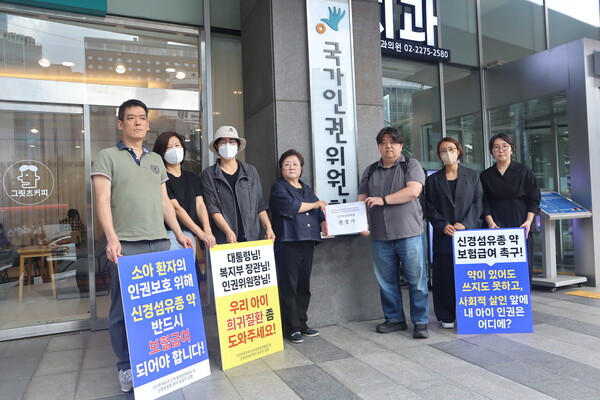As the neurofibromatosis drug Koselugo (selumetinib) faces resubmission to the Pharmaceutical Reimbursement Evaluation Committee meeting on Thursday, patients and their families called for swift insurance benefits.
On Wednesday last week, the Korean Organization for Rare Diseases (KORD) filed a petition with the National Human Rights Commission, demanding the prompt reimbursement of Koselugo.

"In early August, the committee met for the second time to evaluate the coverage of Koselugo," said the representatives of patients’ families of neurofibromatosis patients in the petition. "However, the review's outcome was yet more 'redeliberation,' leaving us frustrated without even knowing the reason.”
Neurofibromatosis is a life-threatening disease without cure, and patients are facing a "social death." Still, according to the petition, the government is only considering economic aspects.
Koselugo is the only treatment option for patients with inoperable plexiform neurofibromas.
In May 2021, it won the Ministry of Food and Drug Safety approval under the fast-track review system. Its developer, AstraZeneca, submitted it to the pharmaceutical evaluation panel in March 2022, but the first reimbursement challenge was unsuccessful.
AstraZeneca Korea tabled it for the second reimbursement challenge last month. Still, the committee deferred the decision again with a "redeliberation” decision.
The news of Koselugo's redeliberation has also caused anxiety among medical professionals. About 90 patients in Korea benefit from Koselugo's treatment through a clinical study. Still, the period ends at the end of this year.
Plexiform neurofibromas are tumors that grow along nerves and cause a variety of symptoms in patients, including pain, motor dysfunction, blurred vision, and scoliosis, according to Dr. Lee Beom-hee, a professor of pediatrics at Asan Medical Center in Seoul, who led the clinical study.
"Fortunately, over the past four years of clinical studies, patients treated with Koselugo have shown improved clinical outcomes, better quality of life, and a positive change in their attitude toward life, which is rewarding for us as physicians,” Professor Lee said. “However, clinical studies cannot guarantee stable, ongoing treatment for patients, and we sincerely hope that faster reimbursement decisions will allow patients to benefit from the treatment."
The head of the rare and intractable disease association agreed.
"In August of last year, the government announced that drugs used for pediatric patients would be exempted from economic evaluation if they demonstrate an improvement in quality of life, even if it is not life-threatening, according to Kim Jae-hak, the KORD chairperson. However, he added that only one drug has been reimbursed due to the improved policy.
"The government has already recognized the seriousness of neurofibromatosis and the innovation of Koselugo's treatment and approved it as the first drug in Korea to be granted fast-track status. However, it hasn't been covered for over two years, which raises serious questions about the effectiveness of the policy improvement,” Kim said. "The current treatment environment, which threatens the lives of patients and their families, needs to be improved as soon as possible."
Patients’ families added appeals, describing their miserable situations.
"Pediatric patients in the U.S. plexiform neurofibromas report 'severely poor quality of life' on eight out of 10 quality-of-life measures," they said, quoting Dr. Karen H. Wagner, executive director of the National Plexiform Neurofibromatosis Association. "Pediatric patients with plexiform neurofibromas have panic disorder, extreme anxiety, and severe depression with daily thoughts of suicide at an early age."
The organization plans to continue publicizing the issue until Koselugo gets insurance benefits. As part of such efforts, it also has called on AstraZeneca, the manufacturer and distributor of Koselugo, to negotiate with the government actively.
On a brighter note, the government and AstraZeneca recently reportedly reached a dramatic agreement on the terms of Koselugo's benefits.
The drugmaker accepted the financial sharing plan proposed by the Health Insurance Review and Assessment Service (HIRA), a green light for the deal to be approved by the pharmaceutical reimbursement evaluation committee this month.
Against this backdrop, industry executives pay close attention to whether the organization’s petition with the National Human Rights Commission will shorten Koselugo's drug price negotiation period.

